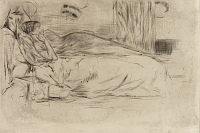The Model Lying Down | ||
| Number: | 110 | |
| Date: | 1873/1874 | |
| Medium: | drypoint | |
| Size: | 188 x 277 mm | |
| Signed: | no | |
| Inscribed: | no | |
| Set/Publication: | no | |
| No. of States: | 1 | |
| Known impressions: | 1 | |
| Catalogues: | K.121; M.120; W.107 | |
| Impressions taken from this plate (1) | ||
KEYWORD
couch, fan, figure, interior, Japonisme, woman reclining.
TITLE
Whistler's original title is not known. There are several possible variations in title, the earliest being totally different from later versions:
Possibly 'Odalisque' (1877, Charles Augustus Howell (1840?-1890)). 2
'The Model Lying Down' (1886, Frederick Wedmore (1844-1921)). 3
'Draped Girl Reclining' (1909, Howard Mansfield (1849-1938)). 4
'Odalisque', the title mentioned in sales of prints to Howell, is an unusual title for a work by Whistler at this time, and it is not certain that it refers to this drypoint; it could possibly have been a nude model such as Nude Reclining [126], or a sleeping model, such as Venus [60]. An alternative title - 'Draped Girl Reclining' - could lead to confusion with other titles, such as Nude Reclining [126].
'The Model Lying Down' is therefore the preferred title.
Possibly 'Odalisque' (1877, Charles Augustus Howell (1840?-1890)). 2
'The Model Lying Down' (1886, Frederick Wedmore (1844-1921)). 3
'Draped Girl Reclining' (1909, Howard Mansfield (1849-1938)). 4
'Odalisque', the title mentioned in sales of prints to Howell, is an unusual title for a work by Whistler at this time, and it is not certain that it refers to this drypoint; it could possibly have been a nude model such as Nude Reclining [126], or a sleeping model, such as Venus [60]. An alternative title - 'Draped Girl Reclining' - could lead to confusion with other titles, such as Nude Reclining [126].
'The Model Lying Down' is therefore the preferred title.
2: Howell to Whistler, [6-15 November 1877], GUW #02178.
3: Wedmore 1886 A (cat. no. 107).
4: Mansfield 1909 (cat. no. 120).
DESCRIPTION
A young woman, with thin full-length draperies outlining her figure, is lying on a sofa. Her head and shoulders rest on pillows at left. She is in profile to right, wearing a scarf around her head, with a few strands of hair emerging at the front. Her right hand is raised to her face and her left arm rests at her side, behind her, with the hand resting on her hip. A cube-shaped box sits on the floor in front of the sofa, at left, and a fan rests on the floor to right of it. The sofa is covered with a cloth that drapes to the floor. Some curious squiggles on the box, and traces of the drapery, show that the box was drawn after the draped divan. In the background Asian fans are arranged on the wall, and towards the right a curtain is half drawn across a window, above dark panelling or a dark, painted dado.
SITTER
Not identified. She may be the same model as in Model Seated [104].
DISCUSSION
The composition is closely related to an earlier study, Nude woman reclining [92], and may have been inspired by or copied from that unfinished study.
The subject of women and fans, in a variety of settings, appears many times in Whistler's work in different media. The fans in this etching are the round or palm-leaf shape of fan, found in Asia, and not the semi-circular fan used at that time in Europe.
Similar oriental fans appear in several paintings, including La Princesse du pays de la porcelaine [y050] and Harmony in Flesh Colour and Red [y091]. The study, In the Studio [m0324], and related oils show Whistler's studio about 1865, with fans on the walls, and models half draped and nude on a sofa. An elaborate cartoon, Venus [m0357], dating from 1869, again shows carefully defined oriental fans on the wall behind a nude model holding drapery. At a slightly later date, around 1872/1874, pastel studies for a portrait of a girl in a white dress, Study for 'Harmony in Grey and Peach Colour' [m0469] and Study in Grey and Pink [m0470], include fans on the wall above a dark dado in the studio. The oriental fan became a defining accessory for an Aesthetic interior of the late 1860s and 1870s.
In this drypoint the model is dressed in silky draperies that are neither eastern nor western nor of any recognisable fashion. The fans are arranged asymmetrically on the wall, but they are clearly eastern accessories in a western setting (the padded, sheeted sofa appears a western artefact). The whole composition is decorative, and a 'classic' of the Aesthetic Movement, of which Whistler was a leading figure.
